How to Save Money on Mobile Phone Repairs in Nigeria
In Nigeria, where the cost of living is constantly on the rise, saving money wherever possible has become a necessity. One area where many Nigerians often overspend is mobile phone repairs. Whether it’s a cracked screen, a faulty battery, or software issues, the cost of fixing a phone can sometimes feel like buying a new one. But don’t worry—this guide is here to help you save money on mobile phone repairs in Nigeria.
At The Price, we understand how important it is to make informed decisions, especially when it comes to your hard-earned money. That’s why we’ve done extensive research, scoured the web, and even checked out the latest X (formerly Twitter) posts to bring you the most updated and practical tips on how to save money on phone repairs.
Let’s dive in!
Why Phone Repairs Can Be Expensive in Nigeria
Before we get into the money-saving tips, it’s important to understand why phone repairs can be so costly in Nigeria. Here are a few reasons:
- High Cost of Genuine Parts: Genuine phone parts like screens, batteries, and cameras are often imported, and the exchange rate makes them expensive.
- Lack of Skilled Technicians: Not all repair shops have trained technicians. Some may even cause more damage, leading to higher repair costs.
- Demand and Supply: With the high rate of phone usage in Nigeria, repair shops are always in demand, and some take advantage of this by hiking prices.
- Fake or Low-Quality Parts: Some repair shops use substandard parts that fail quickly, forcing you to return for another repair.
Now that you know the challenges, let’s explore how you can save money on phone repairs without compromising on quality.
1. Diagnose the Problem Yourself
Before rushing to a repair shop, try to figure out what’s wrong with your phone. Sometimes, the issue might be something you can fix yourself. For example:
- Software Issues: If your phone is freezing or crashing, it could be a software problem. Try restarting the phone, clearing the cache, or resetting it to factory settings (after backing up your data).
- Battery Drain: If your battery is draining fast, check for apps consuming too much power or consider replacing the battery if it’s old.
- Screen Issues: If your screen is unresponsive, it might just need a simple cleaning or recalibration.
There are tons of tutorials on YouTube and blogs that can guide you through basic troubleshooting. By diagnosing the problem yourself, you can avoid unnecessary repair costs.
2. Compare Prices from Different Repair Shops
Not all repair shops charge the same price for the same service. Take the time to compare prices from different shops before making a decision. Here’s how:
- Ask for Quotes: Visit or call at least three different repair shops and ask for a quote. Be specific about the problem to get an accurate estimate.
- Check Online Reviews: Look up the repair shops on Google, social media, or forums like Nairaland to see what others are saying about their pricing and service quality.
- Use Price Comparison Platforms: Websites like The Price can help you compare repair costs for different phone models and issues.
Pro Tip: Avoid going to repair shops in high-end areas or malls, as they tend to charge more. Instead, look for reputable shops in local markets or tech hubs like Computer Village in Lagos.
3. Use Genuine or High-Quality Aftermarket Parts
While genuine parts are the best, they can be expensive. If you’re on a tight budget, consider using high-quality aftermarket parts. These are often cheaper but still durable. Here’s what to do:
- Ask for the Part’s Origin: A good repair shop should be able to tell you where the part is coming from and its quality.
- Avoid “Too Good to Be True” Prices: If a repair shop is offering a screen replacement for an iPhone at a ridiculously low price, it’s probably a low-quality part that won’t last.
- Check Warranty: Some repair shops offer warranties on their parts and services. This can save you money in the long run if the part fails.
4. Learn Basic Repair Skills
If you’re tech-savvy, consider learning basic phone repair skills. You can buy tools and parts online and follow tutorials to fix minor issues like replacing a battery, charging port, or back cover. This can save you a lot of money over time.
Websites like iFixit and YouTube channels like JerryRigEverything offer step-by-step guides for repairing various phone models. Just make sure you’re confident before attempting any repair, as a mistake could cost you more.
5. Negotiate the Price
In Nigeria, bargaining is a way of life, and phone repairs are no exception. Don’t be afraid to negotiate the price with the repair technician. Here are some tips:
- Mention Competing Prices: If you’ve gotten a lower quote from another shop, let the technician know. They might match or beat the price.
- Bundle Repairs: If you have multiple issues, ask for a discount on the total cost.
- Pay in Cash: Some shops offer discounts for cash payments since they avoid transaction fees.
6. Prevent Future Repairs
The best way to save money on phone repairs is to avoid them altogether. Here’s how to keep your phone in good condition:
- Use a Phone Case and Screen Protector: These can prevent cracks and scratches from drops.
- Avoid Overcharging: Overcharging can damage your battery. Unplug your phone once it’s fully charged.
- Keep Your Phone Clean: Dust and dirt can damage your phone’s ports and speakers. Clean it regularly with a soft cloth.
- Install Antivirus Software: This can protect your phone from malware that could cause software issues.
7. Consider DIY Repair Kits
If you’re comfortable with DIY projects, you can buy phone repair kits online. These kits come with all the tools and parts you need to fix common issues like cracked screens or faulty batteries. They’re often cheaper than going to a repair shop, and you can reuse the tools for future repairs.
8. Join Online Communities
Online communities like Nairaland, Reddit, and X (Twitter) are great places to get advice on phone repairs. You can ask for recommendations, share experiences, and even find affordable technicians. For example, a recent X post highlighted a repair shop in Abuja that offers high-quality services at reasonable prices.
9. Know When to Replace Instead of Repair
Sometimes, repairing a phone isn’t worth it, especially if it’s an old model or the repair cost is close to the price of a new phone. Before spending money on repairs, consider:
- The Age of the Phone: If your phone is more than 3 years old, it might be time to upgrade.
- The Cost of Repairs: If the repair cost is more than 50% of the phone’s value, it’s better to replace it.
- Future Repairs: If your phone has a history of frequent issues, it might be more cost-effective to get a new one.
10. Take Advantage of Promos and Discounts
Some repair shops offer discounts during festive periods or special promotions. Follow your favorite repair shops on social media to stay updated on these offers. You can also ask if they have loyalty programs or referral discounts.
11. Understand Common Phone Problems and Their Costs
Knowing the average cost of common phone repairs in Nigeria can help you avoid being overcharged. Here’s a breakdown of typical repair costs (as of 2025) based on research and market trends:
- Screen Replacement:
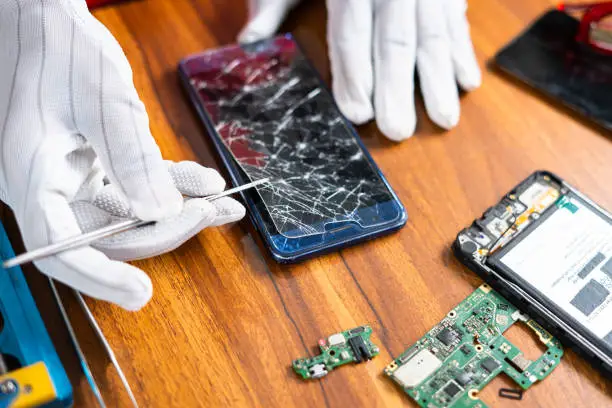
- Low-range phones (e.g., Tecno, Infinix): ₦10,000 – ₦20,000
- Mid-range phones (e.g., Samsung A series, Redmi): ₦20,000 – ₦40,000
- High-end phones (e.g., iPhone, Samsung Galaxy S series): ₦50,000 – ₦150,000
- Battery Replacement:
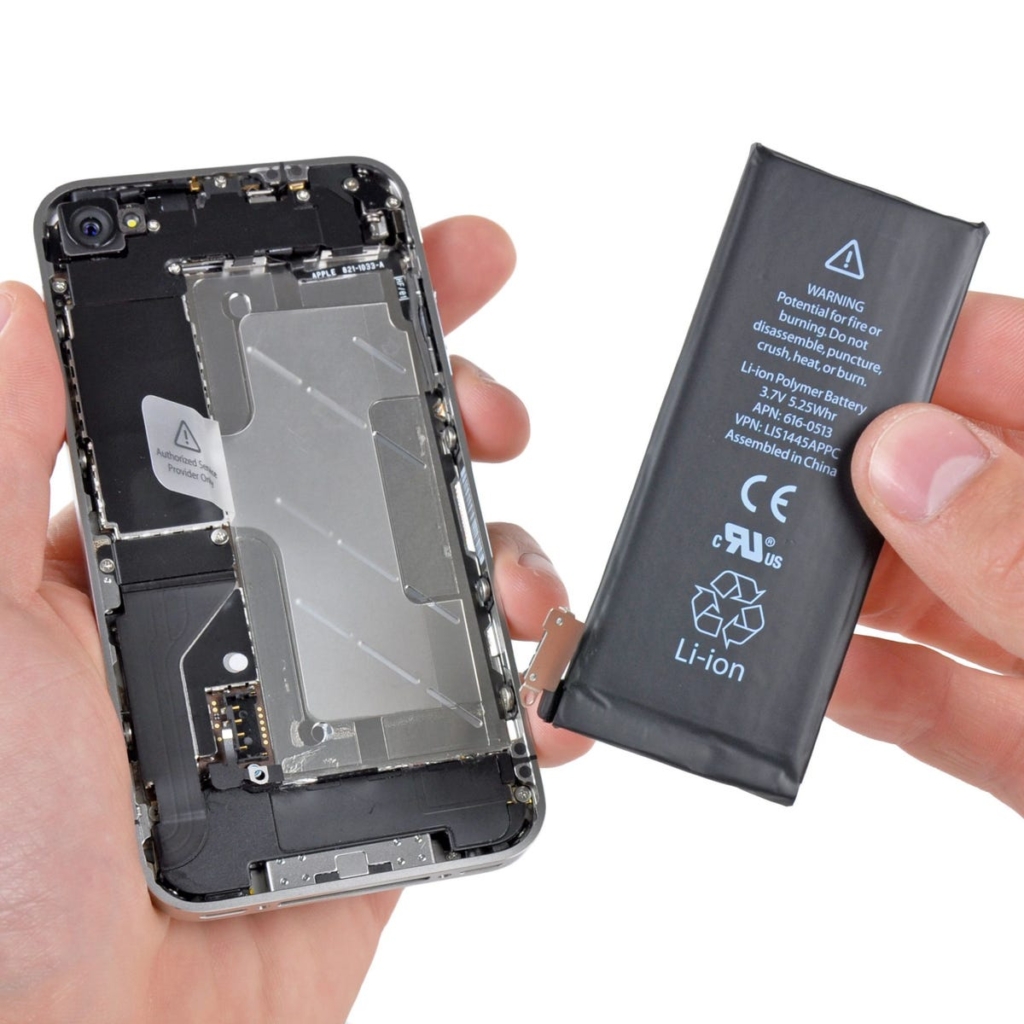
- Low-range phones: ₦5,000 – ₦10,000
- Mid-range phones: ₦10,000 – ₦20,000
- High-end phones: ₦25,000 – ₦50,000
- Charging Port Repair:
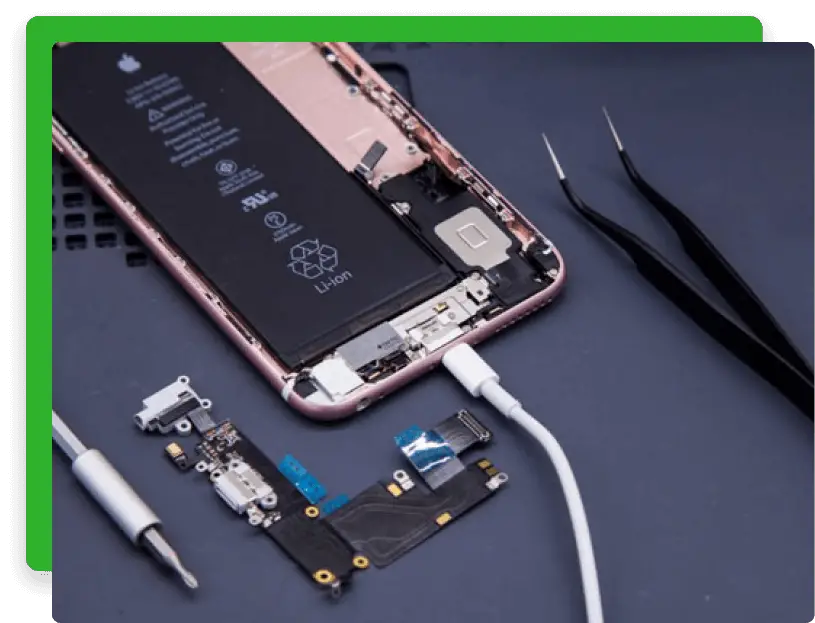
- Low-range phones: ₦3,000 – ₦7,000
- Mid-range phones: ₦7,000 – ₦15,000
- High-end phones: ₦15,000 – ₦30,000
- Software Issues (e.g., Unlocking, Flashing): ₦2,000 – ₦10,000
- Camera Repair:
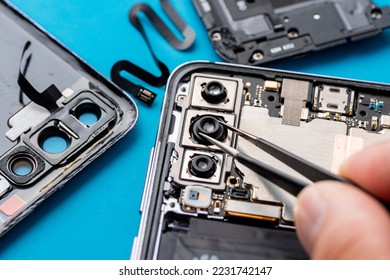
- Low-range phones: ₦5,000 – ₦10,000
- Mid-range phones: ₦10,000 – ₦20,000
- High-end phones: ₦20,000 – ₦50,000
These prices can vary depending on the location, the repair shop, and the quality of parts used. Always confirm the cost before proceeding with the repair.
12. Avoid Unauthorized Repair Shops
While unauthorized repair shops may offer cheaper services, they often lack the expertise and tools to properly fix your phone. Here’s why you should avoid them:
- Risk of Further Damage: Untrained technicians can damage other components while attempting a repair.
- Use of Fake Parts: Unauthorized shops often use counterfeit parts that fail quickly.
- No Warranty: Most unauthorized shops don’t offer warranties, so you’re on your own if the repair fails.
Instead, look for authorized service centers or reputable repair shops with good reviews. For example, Apple and Samsung have authorized service centers in major cities like Lagos, Abuja, and Port Harcourt.
13. Leverage Insurance and Warranty
If your phone is still under warranty or you have insurance, you might be able to get repairs done for free or at a reduced cost. Here’s how to take advantage of this:
- Check Your Warranty Status: Most phones come with a 1-year warranty that covers manufacturing defects.
- Purchase Extended Warranty: Some retailers offer extended warranties for an additional fee.
- Use Phone Insurance: If you have phone insurance, check if it covers accidental damage or repairs.
Pro Tip: Always read the terms and conditions of your warranty or insurance policy to understand what’s covered and what’s not.
14. Explore Mobile Repair Services
In recent years, mobile repair services have become popular in Nigeria. These services send a technician to your home or office to fix your phone. Here’s why they’re worth considering:
- Convenience: You don’t have to leave your house or office.
- Transparency: Many mobile repair services provide upfront pricing and use high-quality parts.
- Time-Saving: You can schedule repairs at your convenience.
Some popular mobile repair services in Nigeria include:
- Fixit45: Offers doorstep repairs for phones, laptops, and other gadgets.
- RepairNg: Provides affordable and reliable phone repair services.
- GadgetMend: Specializes in fixing high-end phones like iPhones and Samsung Galaxy devices.
15. Be Wary of Scams
Unfortunately, the phone repair industry in Nigeria is not immune to scams. Here are some red flags to watch out for:
- Too Good to Be True Prices: If a repair shop is offering a screen replacement for ₦5,000 on an iPhone, it’s likely a scam.
- Pressure Tactics: Some shops may pressure you into making quick decisions or paying upfront.
- No Receipt or Documentation: Always ask for a receipt or documentation of the repair.
- Hidden Charges: Some shops may quote a low price initially but add hidden charges later.
To avoid scams, stick to reputable repair shops and always get a second opinion if something feels off.
16. Consider Refurbished Phones as an Alternative
If your phone is beyond repair or the cost of fixing it is too high, consider buying a refurbished phone. Refurbished phones are pre-owned devices that have been repaired and restored to good working condition. Here’s why they’re a great option:
- Affordable: Refurbished phones are significantly cheaper than new ones.
- Quality Assurance: Reputable sellers test and certify refurbished phones before selling them.
- Warranty: Many refurbished phones come with a warranty, giving you peace of mind.
Some trusted places to buy refurbished phones in Nigeria include:
- Slot: Offers certified refurbished phones with warranties.
- Jumia: Has a dedicated section for refurbished devices.
- Kara: Specializes in high-quality refurbished phones.
17. Use Local Markets Wisely
Local markets like Computer Village in Lagos are known for affordable phone repairs, but they can also be overwhelming. Here’s how to navigate them:
- Go Early: Arrive early to avoid crowds and get the best service.
- Ask for Recommendations: If you know someone who has repaired their phone there, ask for their technician’s contact.
- Inspect the Shop: Look for shops that are organized and have good customer reviews.
- Bargain Smartly: Don’t be afraid to negotiate, but don’t compromise on quality.
18. Stay Updated on Phone Repair Trends
The phone repair industry is constantly evolving, with new tools, techniques, and parts being introduced regularly. Staying updated can help you make informed decisions. Here’s how:
- Follow Tech Blogs: Websites like TechCabal and NaijaTechGuide often publish articles on phone repair trends.
- Join Online Forums: Platforms like Nairaland and Reddit have active communities discussing phone repairs.
- Subscribe to YouTube Channels: Channels like Mr. Phone and TechWithChris provide tutorials and updates on phone repairs.
19. DIY vs. Professional Repairs: When to Choose What
While DIY repairs can save you money, they’re not always the best option. Here’s a quick guide to help you decide:
| Issue | DIY | Professional Repair |
|---|---|---|
| Cracked Screen | Only if you have experience | Recommended for high-end phones |
| Battery Replacement | Easy for low-range phones | Recommended for high-end phones |
| Software Issues | Can be done with tutorials | Recommended if DIY fails |
| Water Damage | Not recommended | Always seek professional help |
| Charging Port Repair | Moderate difficulty | Recommended if you’re unsure |
20. Test the Repair Before Paying
Before paying for a repair, always test your phone to ensure the issue has been resolved. Here’s what to check:
- Screen: Look for dead pixels, touch responsiveness, and color accuracy.
- Battery: Check if it charges properly and holds a charge.
- Camera: Test both front and rear cameras for clarity and focus.
- Speakers and Microphone: Make sure they’re working correctly.
If you notice any issues, inform the technician immediately.
Final Thoughts
Saving money on mobile phone repairs in Nigeria is all about being proactive, doing your research, and making informed decisions. By following the tips in this guide, you can avoid overspending and keep your phone in good condition for longer.
At The Price, we’re committed to helping Nigerians make smart financial decisions. Whether it’s price comparisons, purchasing guides, or money-saving tips, we’ve got you covered.
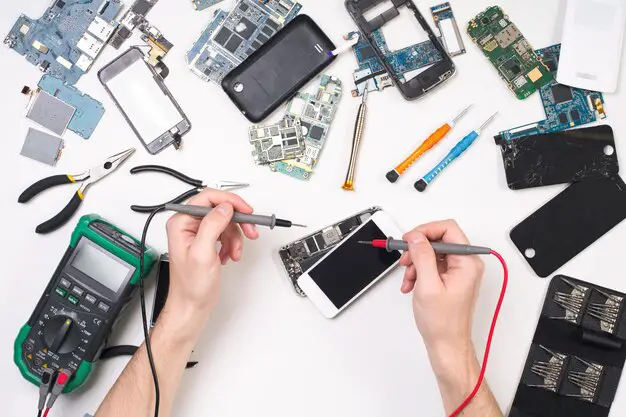


Leave a Comment